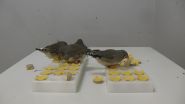(Press-News.org) Researchers add a new twist to the more than century old biological principles of Mendelian inheritance - describing a small group of cells in pregnant mothers that promote genetic fitness and multi-generational reproductive health.
Scientists at Cincinnati Children's Hospital Medical Center report their findings online July 23 in Cell. The study suggests a scientific basis for developing new therapies to promote reproductive health and prevent pregnancy complications like prematurity and stillbirth, according to Sing Sing Way, MD, PhD, senior author and pediatrician in the Division of Infectious Diseases and the Perinatal Institute at Cincinnati Children's.
Mendelian inheritance dictates that reproductive and genetic health is anchored by two parents each passing along only half of their chromosomes to children. The current study reports this is further enhanced across generations by women retaining genetically distinct cells that they pass along to their daughters, granddaughters and great granddaughters. The cells help avoid pregnancy complications by keeping the immune system from attacking the fetus as an invading pathogen.
What makes these maternal cells unique is they are microchimeric, according to researchers. This means the cells are genetically different from the mother and her female offspring. The cells prevent the immune system from rejecting the fetus by coaxing regulatory T cells into recognizing and accepting non-inherited maternal antigens. This suppresses the T cells and holds off an immune system attack.
"Our data suggest that Mendelian genetics is enhanced by maternal-to-offspring transmission of these microchimeric cells from one generation to the next," Way said. "Microchimeric maternal cells can be viewed as mother's little genetic helpers, which are shared in offspring to enforce cross-generational reproductive health."
Serious Health Challenge
Complications arise in about one out of eight human pregnancies. Premature birth - which can lead to a lifetime of chronic illness - along with preeclampsia and stillbirth remain serious global health problems, including in the United States.
Way said pregnancy complications usually occur when the mother's immune system mistakenly attacks the developing fetus as an invading pathogen. Working with mouse models, the authors found protection against pregnancy complications is dramatically enhanced in pregnant mothers with regulatory T cells that are specific for and recognize non-inherited maternal antigen (NIMA).
Although the research was in genetically bred mice, Way said the findings should apply widely to human pregnancies and other mammals requiring in utero development. Mice in the study were engineered so researchers could track the microchimeric maternal cells and T cells that recognize NIMA.
The researchers also noted that mouse pregnancies sired by males having NIMA traits overlapping those of his partner - and those of her mother - were especially resilient against complications.
Nature's Way
Physicians and scientists have known for some time that tolerance to non-inherited maternal antigen exists and can be used to improve outcomes after solid organ or stem cell transplants. Way and his colleagues took into consideration existing research on this phenomenon when designing the current study.
"From a basic biological perspective, mammals did not develop tolerance to non-inherited maternal antigen so that people could have successful transplants, although clearly it is very beneficial in this context," Way said. "There had to be a more fundamental biological reason for it and that is what we discovered in this study."
Researchers are following up the current paper with additional studies into how maternal cells retained in offspring promote immune tolerance. After confirming the molecular details of nature's process for achieving fetal tolerance and resiliency against pregnancy complications, Way said the mechanisms could be mimicked to design new therapies for improving reproductive health and human pregnancy outcomes.
INFORMATION:
Collaborating colleagues from the Division of Infectious Diseases, Perinatal Institute and the Center for Fetal and Cellular Therapy at Cincinnati Children's include: first author Jeremy Kinder, a graduate student in Way's laboratory, along with Tony Jiang, James Ertelt, Lijun Xin PhD., Beverly Strong, PhD., and Aimen Shaaban, PhD.
Funding support for the research came from the National Institute of Allergy and Infectious Diseases (R01AI100934, R21AI112186; the National Heart Lung and Blood Institute (R01HL103745), and the Burroughs Wellcome Fund.
About Cincinnati Children's:
Cincinnati Children's Hospital Medical Center ranks third in the nation among all Honor Roll hospitals in U.S. News and World Report's 2015 Best Children's Hospitals. It is also ranked in the top 10 for all 10 pediatric specialties. Cincinnati Children's, a non-profit organization, is one of the top three recipients of pediatric research grants from the National Institutes of Health, and a research and teaching affiliate of the University of Cincinnati College of Medicine. The medical center is internationally recognized for improving child health and transforming delivery of care through fully integrated, globally recognized research, education and innovation. Additional information can be found at http://www.cincinnatichildrens.org. Connect on the Cincinnati Children's blog, via Facebook and on Twitter.
When does aging really begin? Two Northwestern University scientists now have a molecular clue. In a study of the transparent roundworm C. elegans, they found that adult cells abruptly begin their downhill slide when an animal reaches reproductive maturity.
A genetic switch starts the aging process by turning off cell stress responses that protect the cell by keeping important proteins folded and functional. The switch is thrown by germline stem cells in early adulthood, after the animal starts to reproduce, ensuring its line will live on.
While the studies were conducted ...
Highly-social zebra finches learn foraging skills from their parents. However, new research has found that when juvenile finches are exposed to elevated stress hormones just after hatching, they will later switch strategies and learn only from unrelated adult birds - ignoring their parents' way of doing things and instead gaining foraging skills from the wider network of other adult finches.
Researchers say that spikes in stress during early development may act as a cue that their parents are doing something wrong, triggering the young birds to switch their social learning ...
If you find yourself downing that extra piece of chocolate fudge cake even though you're not hungry, it might be the absence of a hormone in your brain that's causing you to overeat purely for pleasure.
In a new Rutgers Robert Wood Johnson Medical School study published in Cell Reports, researchers found that when the hormone glucagon like peptide-1 (GLP-1) was reduced in the central nervous system of laboratory mice, they overate and consumed more high fat food.
"The mice in which the GLP-1 deficiency was induced ate beyond the need for calories and showed an increase ...
A new study by researchers at University of California, San Diego School of Medicine reveals a protein's critical - and previously unknown -- role in the development and progression of acute myeloid leukemia (AML), a fast-growing and extremely difficult-to-treat blood cancer.
The finding offers a novel target for better treating AML, and possibly other cancers, by cutting off the ability of tumors to access nearby cellular players that feed its growth. The study was published July 23 in Cell Stem Cell.
"The work really focuses on trying to understand the dependence ...
Alexandria, VA - EARTH Magazine takes you to Le Mans, France, to cover how the World Endurance Competition (WEC) race series is transforming automotive efficiency in both high-performance racing and the commercial automotive industries. EARTH's latest feature explores the science behind efficiency upgrades used by three major racing competitors: Porsche, Audi and Toyota.
Using physics and cutting-edge materials results in a "fascinating case study of how unbridled competition can produce unique, innovative and extraordinary solutions to engineering barriers once thought ...
CHAPEL HILL, NC (July 23, 2015) - For years, a crisis has been brewing in molecular biology. The problem is that antibodies--research tools used to identify key proteins at work in a cell--aren't always what they seem. Unreliable antibodies have led to numerous instances of false findings, failed experiments, and wasted money and samples.
Enter the Histone Antibody Specificity Database, a newly launched online portal that lets scientists find the right antibodies for their research with a much higher degree of confidence than ever before. Rather than relying on the claims ...
It's well known that being socially connected promotes a person's overall and psychological health. A new study from the University of Rochester now shows that the quantity of social interactions a person has at 20--and the quality of social relationships that person has at age 30--can benefit her well-being later in life.
People with poor social connections have been shown to be at an increased risk for early mortality. "In fact," said lead author Cheryl Carmichael, who conducted the research as a PhD candidate in psychology at the University of Rochester, "having ...
Astronomers using the Karl G. Jansky Very Large Array (VLA) have discovered jets of material ejected by still-forming young brown dwarfs. The discovery is the first direct evidence that brown dwarfs, intermediate in mass between stars and planets, are produced by a scaled-down version of the same process that produces stars.
The astronomers studied a sample of still-forming brown dwarfs in a star-forming region some 450 light-years from Earth in the constellation Taurus, and found that four of them have the type of jets emitted by more-massive stars during their formation. ...
Chemotherapy for patients with end-stage cancer was associated with worse quality of life near death for patients with a good ability to still perform many life functions, according to an article published online by JAMA Oncology.
Physicians have voiced concerns about the benefits of chemotherapy for patients with cancer who are nearing death. An American Society of Clinical Oncology (ASCO) expert panel has called chemotherapy use among patients for whom there was no evidence of clinical value the most widespread, wasteful and unnecessary practice in oncology.
Holly ...
PHILADELPHIA - Physicians in training are twice as likely to order a costly brand-name statin (used to lower blood cholesterol levels) when supervised by senior physicians who prefer those medications in their own practice, according to a new study led by researchers at the Perelman School of Medicine at the University of Pennsylvania and published online in the Journal of General Internal Medicine. These findings document a link between low-value prescribing and graduate medical training, which physicians undergo after completing medical school but before they can practice ...

